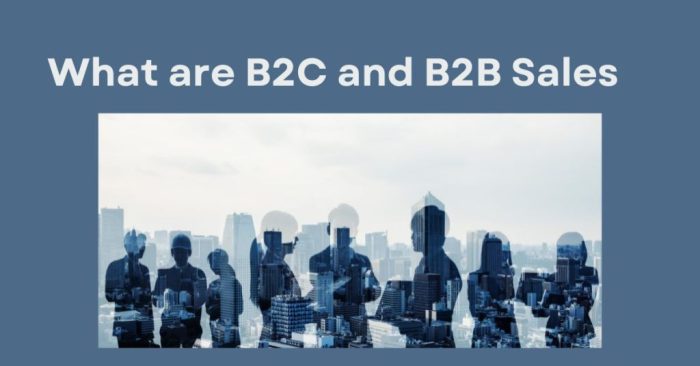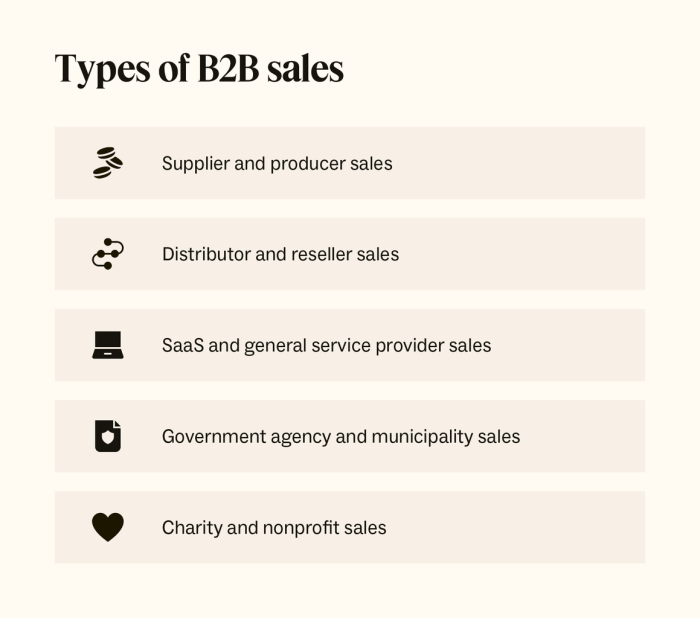Understanding B2B and B2C Sales sets the stage for exploring the nuances of business-to-business and business-to-consumer sales, offering a deep dive into strategies and techniques that drive success in both realms.
From dissecting target audiences to unraveling effective sales strategies, this topic unravels the secrets to mastering B2B and B2C sales.
Understanding B2B and B2C Sales
In the world of sales, understanding the key differences between B2B (Business to Business) and B2C (Business to Consumer) sales is crucial. Let’s dive into the specifics of each and explore their unique characteristics.
Differences between B2B and B2C Sales
- B2B sales involve selling products or services from one business to another business. This often includes bulk orders, longer sales cycles, and a focus on building relationships.
- B2C sales, on the other hand, are transactions between a business and individual consumers. These sales typically involve smaller quantities, shorter sales cycles, and a strong emphasis on marketing and branding.
Typical Target Audiences for B2B and B2C Sales
- The target audience for B2B sales is businesses, such as manufacturers, wholesalers, or service providers, looking to purchase products or services for their operations.
- For B2C sales, the target audience consists of individual consumers who are buying products or services for personal use or consumption.
Examples of Products or Services in B2B and B2C Sales
- B2B: Software solutions for businesses, industrial machinery, office supplies, consulting services, and raw materials.
- B2C: Clothing, electronics, beauty products, food and beverages, entertainment services (like streaming platforms), and personal care services.
B2B Sales Strategies
In the world of B2B sales, building strong relationships is key to success. This involves more than just making a sale; it’s about establishing trust and credibility with your clients. Personalized communication and content marketing play a crucial role in achieving this goal.
Building Relationships in B2B Sales
- Focus on understanding the needs and pain points of your clients. Tailor your approach to address their specific challenges.
- Regularly engage with clients through personalized interactions, such as follow-up emails or phone calls. Show genuine interest in their success.
- Provide value beyond the sale by offering expert advice, industry insights, and solutions to help your clients achieve their business goals.
- Establish yourself as a trusted partner rather than just a vendor. Build long-term relationships based on mutual respect and collaboration.
Role of Personalized Communication in B2B Sales
- Personalized communication shows clients that you understand their unique needs and are committed to meeting them.
- Use client data and insights to tailor your messages and offers. Address clients by name and reference previous interactions to create a personalized experience.
- Listen actively to clients’ feedback and concerns. Respond promptly and empathetically to build rapport and trust.
- Provide ongoing support and maintain open lines of communication to strengthen relationships and encourage repeat business.
Utilizing Content Marketing in B2B Sales Efforts, Understanding B2B and B2C Sales
- Create informative and relevant content that addresses the challenges and interests of your target audience.
- Distribute content through various channels, such as blogs, social media, and email newsletters, to reach a wider audience and establish thought leadership.
- Offer valuable resources, such as whitepapers, case studies, and webinars, to showcase your expertise and attract potential clients.
- Track the performance of your content marketing efforts using analytics to refine your strategies and ensure optimal results.
B2C Sales Techniques

When it comes to Business-to-Consumer (B2C) sales, emotional connection plays a crucial role in influencing purchasing decisions. Unlike B2B sales which are more rational and logic-driven, B2C sales involve appealing to the emotions of individual consumers to drive sales.
Importance of Emotional Connection in B2C Sales
Creating an emotional connection with consumers can lead to brand loyalty, repeat purchases, and positive word-of-mouth recommendations. By tapping into consumers’ emotions, companies can establish a deeper connection that goes beyond just the product or service being offered.
Leveraging Social Media for B2C Sales
- Utilizing social media platforms like Instagram, Facebook, and Twitter allows companies to engage directly with consumers, share compelling content, and create a sense of community around their brand.
- Through targeted advertising and influencer partnerships, businesses can reach a wider audience and drive traffic to their online stores or physical locations.
- Engaging with customers through social media channels also provides valuable insights into consumer preferences, trends, and feedback that can inform future marketing strategies.
Examples of Successful B2C Sales Campaigns
- Apple’s “Shot on iPhone” campaign showcased user-generated photos taken with iPhones, highlighting the quality of the camera and encouraging customers to share their own photos on social media.
- Dove’s “Real Beauty” campaign focused on promoting body positivity and self-esteem, resonating with consumers on a personal and emotional level.
- Coca-Cola’s “Share a Coke” campaign personalized their bottles with popular names, creating a sense of exclusivity and encouraging consumers to purchase bottles with their own name or the name of a loved one.
Sales Funnel in B2B and B2C

In both B2B and B2C sales processes, the sales funnel plays a crucial role in guiding potential customers from awareness to making a purchase. However, there are significant differences in how the sales funnel is structured and executed in these two contexts.
Comparing the Sales Funnel
- In B2B sales, the sales funnel tends to be longer and more complex, involving multiple decision-makers and a more consultative approach.
- On the other hand, the B2C sales funnel is often shorter and more straightforward, focusing on individual consumers and their immediate needs.
- While both funnels aim to convert leads into customers, the B2B funnel typically requires more nurturing and relationship-building due to the higher value and longer sales cycles involved.
Lead Generation in B2B and B2C
- In B2B sales, lead generation often involves targeted marketing strategies, such as account-based marketing and personalized outreach to key decision-makers.
- Conversely, B2C lead generation is more focused on mass marketing tactics, such as social media advertising and email campaigns to reach a larger audience.
- Lead generation in B2B sales is about identifying and engaging with companies that have a need for the product or service, while B2C lead generation is about appealing to the individual consumer’s desires and preferences.
Customer Retention in B2B and B2C
- Customer retention is vital in both B2B and B2C sales processes to ensure long-term profitability and loyalty.
- In B2B sales, customer retention often involves providing ongoing support, proactive communication, and personalized solutions to meet the client’s evolving needs.
- For B2C sales, customer retention strategies may include loyalty programs, exclusive offers, and exceptional customer service to keep individual consumers coming back for more.